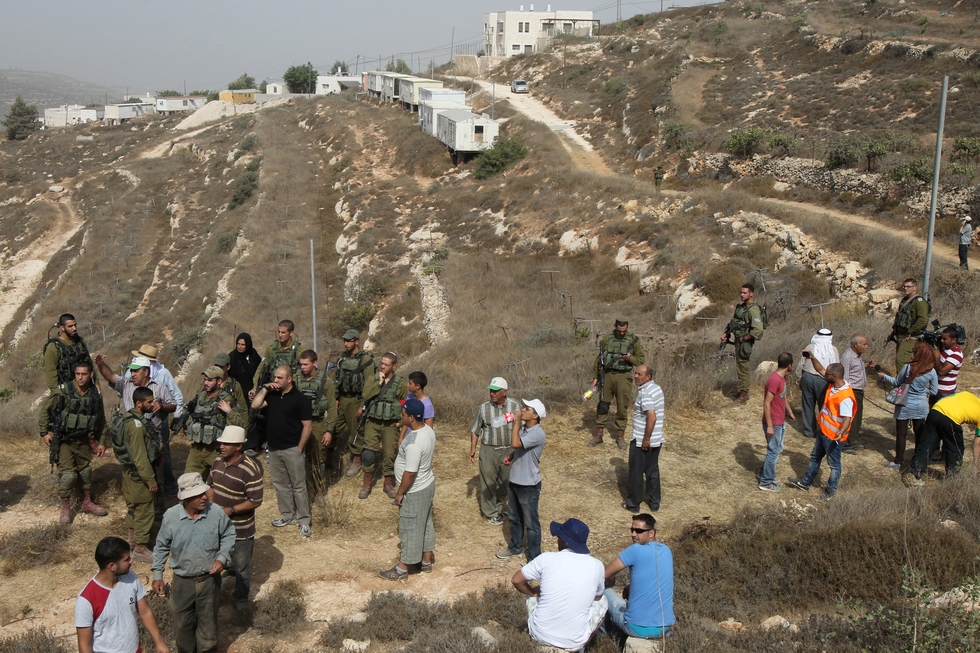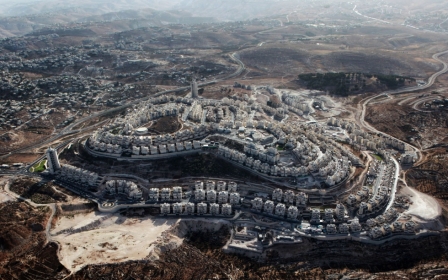Businesses in Israeli settlements contribute to rights abuses: HRW

Companies operating in Israeli settlements in the occupied West Bank contribute to "an inherently unlawful and abusive system" violating Palestinian rights and should halt their activities there, Human Rights Watch said on Tuesday.
The new report from the US-based rights group describes Israeli policies in the West Bank that lead to government support of settlements, the "unlawful confiscation" of Palestinian land and denial of permits to Palestinians.
According to the report, which cites examples of foreign firms linked to settlements, including cement and real estate companies, "Israel's privileged treatment of settlers extends to virtually every aspect of life in the West Bank".
"Settlement businesses unavoidably contribute to Israeli policies that dispossess and harshly discriminate against Palestinians, while profiting from Israel's theft of Palestinian land and other resources," HRW's Arvind Ganesan said in a statement.
"The only way for businesses to comply with their own human rights responsibilities is to stop working with and in Israeli settlements."
The report stated that foreign businesses that operate in settlements are “settlers” themselves, where they benefit from low rents, promising tax rates, government subsidies, and access to cheap Palestinian labour.
Israeli settlements under international law are illegal, with the Fourth Geneva convention banning an occupying power from transferring its citizens into the territory it occupies.
Israel's foreign ministry said officials were studying the report, but called it "one-sided."
"At a time when Israel and the international community are taking practical steps to bolster the Palestinian economy and increase Palestinian employment, Israel is concerned with this one-sided, politicised report, which jeopardises the livelihoods of thousands of Palestinians and discourages rare examples of coexistence, coordination and cooperation between Israelis and Palestinians," it said.
Israel occupied the West Bank in the 1967 Six Day War and more than 500,000 Israeli settlers now live in the territory and in east Jerusalem.
The 1993 Oslo Accords divided the West Bank into zones known as Areas A, B and C.
Area C, which amounts to about 60 percent of the West Bank, is under full Israeli military and civilian control.
The accords were intended to lead to a permanent resolution within five years, but more than two decades later, peace efforts are at a standstill as the Israeli occupation shows no sign of slowing down.
Furthermore, an ongoing spate of Palestinian gun, knife and car-ramming attacks that erupted in October has raised tensions between the two sides, and contributed to the marginalisation of the Palestinian Authority.
Palestinians 'all but barred'
Some analysts say frustration with Israel's continuing occupation as well as the Palestinians' fractured leadership have been key reasons for the violence.
Israel blames incitement by Palestinian leaders and media for the continuing attacks, which has killed over 130 Palestinians and 20 Israelis.
The Israeli army announced on Tuesday that Palestinian workers in Jewish settlements - around 11,000 - are prohibited from working there, following recent attacks.
A spokesperson for the army insisted that the measure was not a form of collective punishment but necessary to maintain order within the settlements.
Palestinian workers in settlements make up two percent of the workforce. The Palestinian population in the West Bank are prevented from accessing Area C, where foreign firms operate their businesses to the benefit of settlements.
"Israel all but bars Palestinians from building or extracting natural resources" in the area, said HRW.
Two examples it cited were Germany's Heidelberg Cement and US-based Remax real estate.
Heidelberg told HRW that it believed its Nahal Raba quarry "does not infringe the human rights and livelihoods of the Palestinian people" and provided Palestinians with well-paid jobs.
Remax did not respond to HRW, but has said previously that its offices are independently owned and operated.
It said it "understands the serious nature of the controversy surrounding real estate operations in the West Bank and has been working to a find a resolution that is acceptable to all parties."
New MEE newsletter: Jerusalem Dispatch
Sign up to get the latest insights and analysis on Israel-Palestine, alongside Turkey Unpacked and other MEE newsletters
Middle East Eye delivers independent and unrivalled coverage and analysis of the Middle East, North Africa and beyond. To learn more about republishing this content and the associated fees, please fill out this form. More about MEE can be found here.



